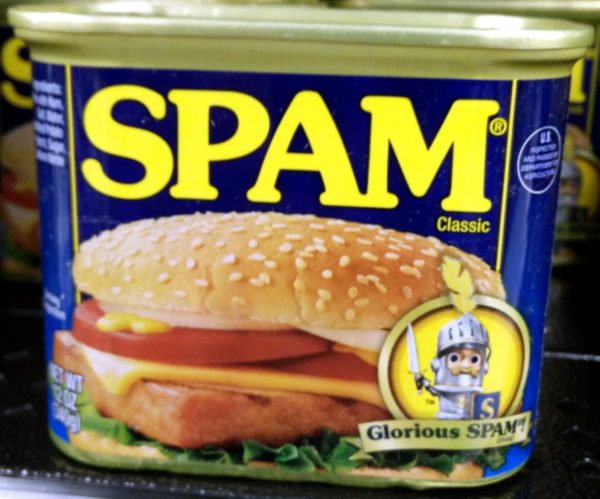 Spam, Eggs, and Rice. That was a familiar and comforting meal when I was a kid, and I still feel that way today. While Spam has been condemned as the epitomy of unhealthy processed food, I recently learned about an article, a play, and a poem singing its praises. What has Spam done to earn such accolades? In many ways, as Eric Kim writes here, eating Spam is part of an experience that for Asian Americans of many different ethnic backgrounds is fundamental to their identity.
Spam, Eggs, and Rice. That was a familiar and comforting meal when I was a kid, and I still feel that way today. While Spam has been condemned as the epitomy of unhealthy processed food, I recently learned about an article, a play, and a poem singing its praises. What has Spam done to earn such accolades? In many ways, as Eric Kim writes here, eating Spam is part of an experience that for Asian Americans of many different ethnic backgrounds is fundamental to their identity.
While I knew about (and love) Spam Musubi, I didn’t know about how widespread the love of Spam is across Asian American and even Pacific Islander communities. Kim talks about Korean communities use of it. In the comments to his article (definitely worth checking out), Pacific Islanders talk about eating it. I already knew that many Filipino Americans like myself love it, and what many Spam loving Asian Americans and Pacific Islanders have in common is a history of interaction with American Military. Not only do Asians Americans and Pacific Islanders reminisce about Spam, but other people who have a common history of eating spam as a cheap food when they were struggling to get by.
Kim’s article mentions an Asian American play that uses Spam as a central theme, called Specially Processed American Me. About Jaime Sunwoo’s play:
Specially Processed American Me by Jaime Sunwoo is a surreal autobiographical performance using SPAM, the canned meat, as a portal into her Asian American upbringing and her family’s experiences of the Korean War. It investigates SPAM’s legacy in the military, its significance in the Asia-Pacific, and its influence on Asian cuisine through music, shadowplay, and cooking. Oscillating wildly between absurd humor and sober tragedy, Specially Processed American Me is a thought-provoking exploration of one of America’s most misunderstood foods.
Sunwoo has hosted workshops associated with the play, where people talk about food and stories over a shared meal of Spam. You can even submit a story about Spam on her website.
The comments of Kim’s article also have a pointer by a poem called Spam by Roberto Ascalon. It starts with the following:
My father’s love
is a fried Spam sandwich.
I never have had a fried Spam sandwich, but as so many Asian American parents express their love through food rather and don’t say “I love you” explicitly, this opening line resonated for me.
Why does Spam seem to resonate so well with Asian Americans? I think it is the shared experience among so many Asian Americans – a food that is well regarded by family and home culture but is embarrassing to reveal to outside mainstream Americans. It is also the shared experience of a cheap affordable food from the days of being a struggling, immigrant family trying to make it in America. To find out more, I suggest you check out Kim’s article as well as Roberto Ascalon’s poem and the website for Sunwoo’s play. I would love to go to one of her workshops to eat and talk about Spam whenever plays and workshops can be held again in person.
(photo credit: Open Food Facts under CC3)








